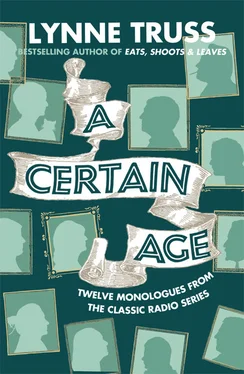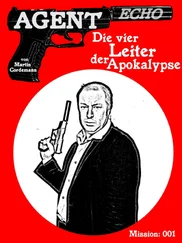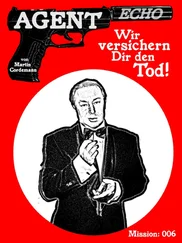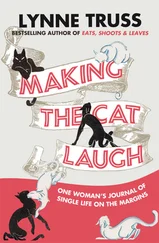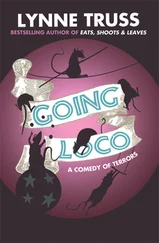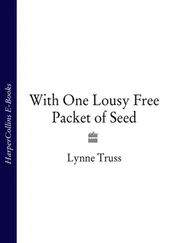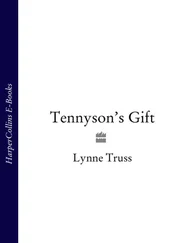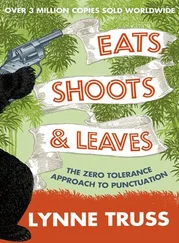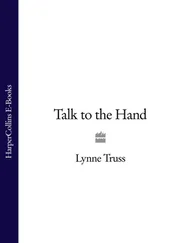LYNNE TRUSS
A Certain Age

Cover
Title Page LYNNE TRUSS A Certain Age
Introduction
A Note on the Text
The Brother
The Wife
The Son
The Mother
The Father
The Daughter
The Married Man
The Sister
The Husband
The Other Woman
The Pedant
The Cat Lover
Cast
About the Author
From the reviews of A Certain Age
By the same author
Copyright
About the Publisher
Introduction Contents Cover Title Page LYNNE TRUSS A Certain Age Introduction A Note on the Text The Brother The Wife The Son The Mother The Father The Daughter The Married Man The Sister The Husband The Other Woman The Pedant The Cat Lover Cast About the Author From the reviews of A Certain Age By the same author Copyright About the Publisher
These monologues were written for BBC Radio Four, and appeared in two series. The first, which comprised all the female voices, was broadcast in 2002. The second series (the men) followed in 2005. Many were written specifically for the actors who played them, so to that extent are collaborations. All were produced by Dawn Ellis, of BBC Radio’s Light Entertainment department, who put as much of her heart and soul into them as I did. Since the whole point of a monologue is that it should speak for itself, I hope these pieces don’t require much by way of introduction. I’d just like to mention a few things to put them in context.
Since the advent of the video diary, we’ve become so accustomed to stories told in this particular straight-to-audience form that you could be forgiven for assuming (as I did when I started writing mine) that it had been knocking around since ancient times. How those Athenian theatre festival-goers were delighted, for example, when, over a series of well-crafted scenes, the goddess Athena endured and reported (to no one in particular) the roller-coaster emotions involved in setting up her successful high-street poster company. But, in fact, no such play seems to have come down to us. When Alan Bennett wrote his first Talking Heads in the late 1980s, it seems he was pioneering a quite new dramatic form.
Up to that point, a “monologue” could mean any number of things: to a student actor, it was any uninterrupted speech learned for audition purposes; to a literary critic, it was a type of Victorian poem. Of course, there were stage monologues, both in the legitimate theatre and in the music hall, but they were unlike Bennett’s in two respects: first, they were generally addressed to a particular, unseen person; and second, they were fixed in time. As recently as 1983, a critic wrote that the monologue “lacks the resources to develop the temporal dimension, the notion of life as a continuing process of growth and change”. But then Bennett came along and divided his monologues into scenes, and suddenly the temporal dimension was added, just like that. There was a simple fade to black, then a fade up again. At a stroke, this completely changed the kind of story that could be told.
My own monologue career started in the mid-1990s, when I was asked to write scripts for the Natural History Unit in Bristol. A radio series called Dear Sir … Yours, Ruffled was to put the case for six unloved common British species, by having them voice their own story, as if in rather furious letters to The Times. My job was to tackle two of these stout defences: an urban fox, for Tony Robinson, and a grey squirrel, for June Whitfield. Instantly, I was in heaven. “Do you think that old teabag is going begging?” the fox interrupted himself, before he gulped it down. I had him shudder at the thought of Basil Brush: “Those dead eyes, you know, like buttons.” And in between the jokes, of course, there was lots of natural history information, such as the disgusting news that people used to rub squirrel brain on the gums of teething babies.
A series called Tidal Talk from a Rock Pool followed (I had nothing to do with these titles), and I had another field day with that. We had Bill Wallis playing a periwinkle, Geoffrey Palmer as a hermit crab, Alison Steadman as an anemone (“My enemy’s anemone is my friend”), Greg Proops as a goby fish, Judi Dench as a limpet and Tony Robinson as a lugworm. I made the periwinkle a kind of music hall comedian trying to cheer up all the others. “So the big shark says, ‘Here’s that sick squid I owe you’, ha ha. All right, suit yourselves; I’m wasted here.”
The animal I cared most about in that series was the limpet: stuck, lonely and bitter, on its rock while the salt waves surged and the far horizon beckoned. “Moscow! Moscow! Moscow!” she cried. She browsed algae from the rock, gossiped about the lewdness of the American slipper limpet, and quoted from Tennyson and Oscar Wilde. Judi Dench chose a Celia Johnson voice, which was superb; she also gamely stuffed her cheeks with Maltesers to represent the algae-browsing activity. The limpet went for a short walk, which meant she had to lift her shell and shuffle an inch or two, making comical straining and exertion noises. “I don’t know if you’ve ever had the misfortune to befriend a limpet,” she confided in a whisper, “but they are notoriously hard to shake off.” She remembered in despair that her mother once upbraided her, in her youth, for her unfortunate habit of “dwelling on things”.
Maybe I’ve been making heavy weather of this monologue-writing, but the image of the limpet blindly shuffling its shell along, while panting and groaning, does quite resemble what it was like to inhabit each of the twelve characters in this book. You may have seen the movie Being John Malkovich, in which a mysterious portal behind a filing cupboard allows people to occupy the brain of John Malkovich for ten minutes at a time, seeing the world through his eyes, and then (if they concentrate very, very hard), getting him to say things, or move his arm. Writing monologues is similar to that. I’ve varied the form as much as I can in these twelve: there are plotty ones and organic ones; twisty and straightforward; light and dark; redemptive and non-redemptive. One of them – “The Husband” – is simply exposition. But all of them required the same strenuous mental puppeteering. These are not all nice people, by the way; but that’s part of the point of doing it.
From the technical point of view, what I was most surprised to learn about the monologue is that there are all sorts of stories that can’t be told this way. In proposing the men’s series, for example, I came up with this idea for “The Son”, which turned out to be unworkable:
The Son
Jason is a Kiwi vet, unmarried, straight, and popular with the pet-ladies of his West Country parish because of his understanding tone. They are all in love with him: he seems to be refreshingly in touch with his “feminine side”. It doesn’t even bother them when their pets fail to flourish under his care. But when he learns that his mother has died in New Zealand, he goes to pieces, and is dropped by everyone. It turns out that his feminine-side appeal has limits.
Tone: arch Theme: access to “feminine” emotions Ideal casting: Martin Clunes
Now, there are problems with this that anyone can spot –Martin Clunes with a New Zealand accent being just one of them. But the main problem is that the protagonist of this story can’t actually tell it, because it’s mainly about how he is unconsciously perceived by other people. If he knows these women all adore him for his feminine side, the theme stops being “access to emotions” and becomes manipulativeness or even vanity. Anyway, I quickly dropped this idea, and instead wrote a “Son” that was about a light-hearted photographer’s very happy and matter-of-fact relationship with his dead father, which was possibly my favourite of the whole twelve. By way of counter-example, there is this:
Читать дальше
